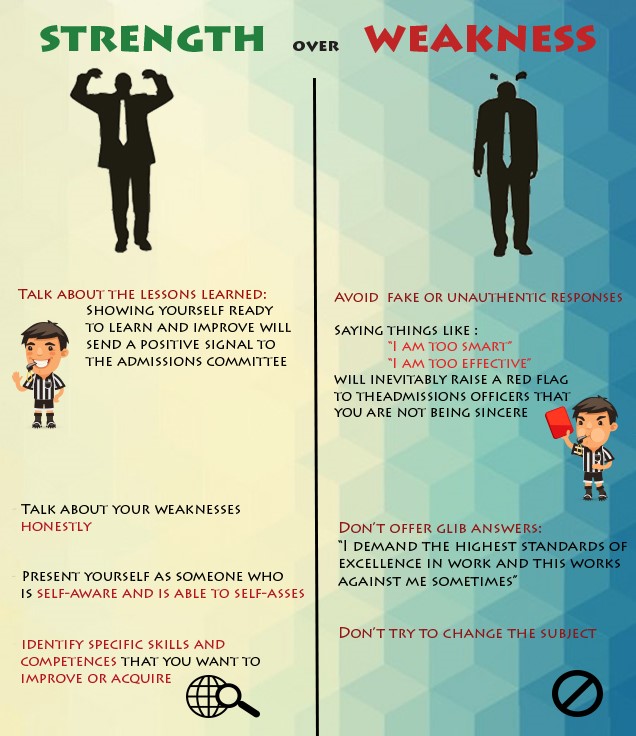As an applicant, discussing your strengths and weaknesses with business schools requires you to be specific about genuine challenges while demonstrating self-awareness and improvement. The key is to face these questions head-on, show concrete steps you’ve taken to address your weaknesses, and be balanced in your response regarding strong vs. weak sides.
Talking about your strengths, weaknesses, and failures as part of your business school application may be a surprisingly difficult task. Part of the challenge consists in the need to discuss failures and weaknesses without making them look bad on your b-school application. Addressing the question properly will give you a leg-up in your efforts to get admitted to the program of your choice.
This part of the application process is also difficult because business school candidates, being professionals and entrepreneurs, are used to presenting both themselves and their businesses in the best possible light.
Talking about your weaknesses honestly without undermining your chances of admission is a strength in itself. Admissions officers are looking for candidates who show superior self-understanding and who are fully aware of their strengths and weaknesses. Presenting yourself as someone who is self-aware and is able to self-assess will considerably increase your chances of admission.
Your interviews and essays may include some variation of the following questions:
- What are your three greatest strengths and three greatest weaknesses?
- What are your greatest management weaknesses?
- What will the admissions committee perceive to be your greatest weakness as an applicant?
- Tell me about a team experience that was a failure for you.
- Tell me about a time when you failed to persuade someone of your view.
- Describe a significant failure in your life and what you learned from it.
So what is the right way of addressing questions about your strengths, weaknesses, and failures? Here are a few tips.
Facing Weaknesses Head-On: How to Tackle Tough Questions
A common mistake is to avoid the question or try to change the subject. This is not going to go down well with the admissions commission. If you do that, you will come off as someone who ducks tough questions.
Another unwise move would be to resort to stock expressions or offer glib answers such as: “I demand the highest standards of excellence in work and this is not always in my favor”. Such a response will not work and it may even irritate the person who is interviewing you or reading your essay.
So how do you avoid making those two mistakes? One of the simplest and most effective strategies is to be specific – zoom in on a particular weakness and explain what you are doing about it. You can give examples and list the things you do to eliminate your weakness.
How to Show Improvement
You should demonstrate that you have taken steps to improve and assumed responsibility for your missteps. This means that you should by no means blame others for your failures, be it employers, colleagues, upbringing, ethnicity etc. Even though you are talking about failure, the overall tone has to be positive, and blaming others would inevitably overshadow the picture you are painting of yourself.
Put the emphasis on improvement and the measures you have taken to work on your weakness. Talk about the lessons learned. Every mistake is an opportunity to self-assess and learn, not a reason to despair and point the finger. Showing yourself ready to learn and improve will send a positive signal to the admissions committee which is looking for candidates who will benefit the programme and the other participants.
Good vs. Bad Weaknesses: What to Mention and What to Avoid
There are weaknesses that sound authentic. While losing one’s cool during a heated meeting or questioning one’s abilities while steering a challenging project may sound like valid weaknesses, there are responses that may come across as fake or unauthentic. Saying things like “I am too smart,” or, “I am too effective” will inevitably signal to the admissions officers that you are not being sincere. Some weaknesses are just indefensible. Saying that you are lazy, arrogant, or overly aggressive is tantamount to shooting yourself in the foot. You should think about the weaknesses you want to mention but largely try to play it safe.
|
Good weakness |
Bad weakness |
|
Struggling to maintain composure in high-stress discussions |
Claiming to be “too perfect” or “too intelligent” |
|
Self-doubt when managing complex projects |
Presenting strengths as weaknesses (“I work too hard”) |
|
Difficulty delegating tasks to team members |
Admitting to laziness or poor work ethic |
|
Tendency to over-prepare for presentations |
Describing yourself as arrogant or dismissive |
|
Getting too focused on details and missing deadlines |
Being overly aggressive or confrontational |
|
Public speaking anxiety that affects performance |
Lacking basic professional skills or reliability |
How to Prepare Effectively
The best way to avoid citing any of the unacceptable weaknesses mentioned above is to prepare. Think about your weaknesses and how to present them in a way that casts you in a positive light. Make a list of weakness/failure responses so you don’t have to come up with answers off the cuff.
Ensure to identify specific skills and competences that you want to improve or acquire in order to achieve your long-term goals. In the best case, you will be able to explain how the MBA program of your choice will help you hone those skills so you can reach your post-MBA goals. Don’t underestimate questions regarding weaknesses in the MBA interview.
Maintaining Balance: The 50/50 Weakness/Strength Ratio
When asked about weaknesses and strengths, it’s important to maintain balance in your response.
Common Mistakes:
- Spending too much time talking about strengths
- Allocating very little time (or space, in essays) for weaknesses
- Giving answers that come across as incomplete and glossed over
- Students should look for balance when addressing such questions; otherwise, the response will fail to demonstrate genuine self-reflection
Reframe Your Perspective:
- Don’t fear questions about weaknesses and failures
- View them as a chance to present yourself as self-aware
- Use these opportunities to show you are realistic about your abilities
- Demonstrate that you are a good fit for the particular program
The key is treating weaknesses with the same level of thoughtfulness and detail as you would your strengths.
How to Structure Your MBA Essay about Strengths and Weaknesses
When talking about your strengths and weaknesses in the MBA essay, follow the same line of thought discussed so far: authentic and balanced self-reflection.
Begin with a brief introduction that acknowledges both your strengths and areas for improvement, then dedicate equal space to each. For weaknesses, you could use the STAR method (Situation, Task, Action, Result) to provide specific examples. Explain the steps you’ve taken to address them and connect how the MBA program will help you continue improving – this is crucial in an MBA application to show future-oriented thinking and clear goals.
For strengths, provide examples with measurable outcomes and highlight how these qualities will contribute not only to your future career objectives, but to the MBA community as a whole. This link is vital as it shows you can leave a lasting positive impact in your MBA class.
Examples of Common Weaknesses in MBA Interviews
One of the most challenging parts of the MBA interview is discussing strengths and weaknesses, so it’s important to be specific about both to showcase your self-awareness. When addressing applicants’ weakness in your essay or interview, focus on how you overcame the challenge and what you learned from it.
Here are three specific examples:
- Difficulty with public speaking under pressure: “During my first year as a project manager, I struggled with presenting quarterly results to senior executives. My nervousness would cause me to rush through key points and miss important details. I enrolled in a Toastmasters program and practiced presentation techniques for six months. Now I can confidently present to C-level executives and have received positive feedback on my communication clarity.”
- Tendency to micromanage team members: “In my role as team lead for a software development project, I initially tried to oversee every detail of my team’s work, which slowed productivity and frustrated my colleagues. I realized this stemmed from my desire for perfection but was counterproductive. I worked with a mentor to develop delegation skills and learned to set clear expectations while giving team members autonomy. This improved both team morale and project delivery times.”
- Impatience with slow decision-making processes: “Early in my consulting career, I became frustrated when clients took weeks to approve recommendations that seemed obviously beneficial. This impatience sometimes showed in my communication, potentially damaging client relationships. I learned to better understand organizational dynamics and stakeholder concerns, developing strategies to help clients move through decision-making more efficiently while respecting their internal processes.”
A common mistake in MBA interviews is avoiding the question about weaknesses, when in fact addressing it head-on actually demonstrates maturity and self-reflection. A confident, authentic, and balanced answer will certainly improve your chances of admission.













Comments